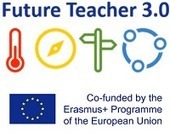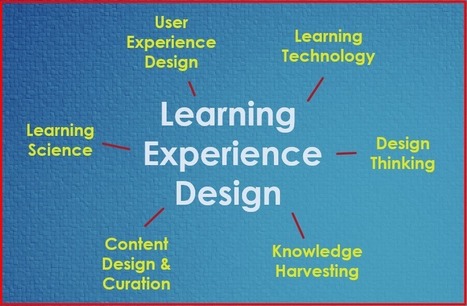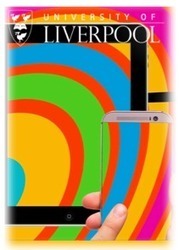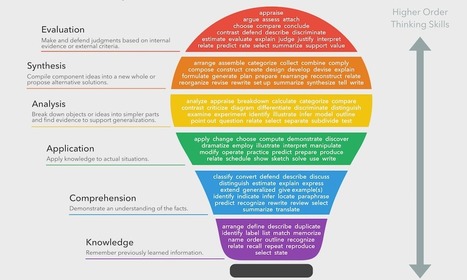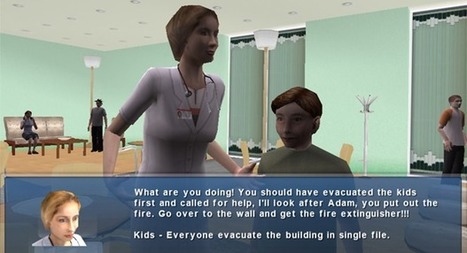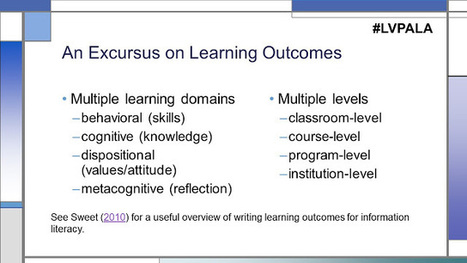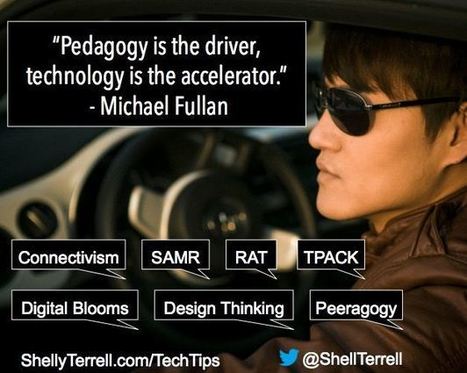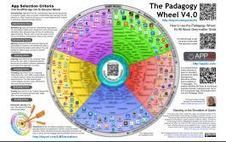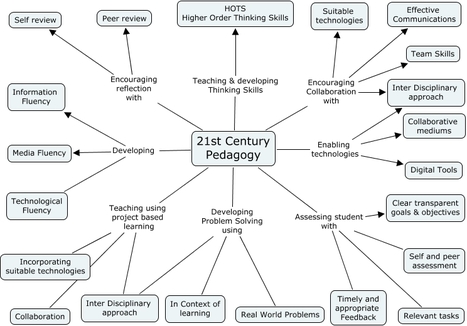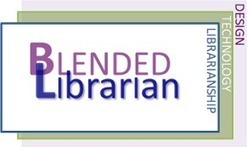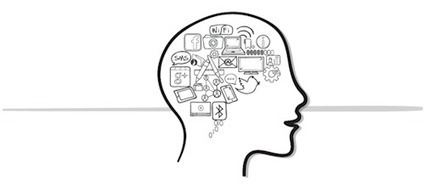As more and more teachers and educators resort to the services of the web to help with the delivery of their teaching, the question of how we can best use technology to serve our pedagogical practices become even more persistent. In this regard, SAMR model as conceptualized by Dr Ruben Puentedura (2006) is a good analytic framework you should definitely consider..
Get Started for FREE
Sign up with Facebook Sign up with X
I don't have a Facebook or a X account

 Your new post is loading... Your new post is loading...
 Your new post is loading... Your new post is loading...
Current selected tag: 'pedagogical framework'. Clear
Future Teacher Talks are free monthly webinars on various topics surrounding online learning as part of the wider Future Teacher 3.0 project. Read more about the wider project on the about page.Each webinar begins with a short introduction and then in many cases engaging and interactive presentations from guest presenters. The webinars are fully interactive and you will have plenty of opportunity to actively participate and contribute.
Elizabeth E Charles's insight:
A fantastic series of webinars, that will be re-run in 2019/20. Great source of resources, research, pedagogy and practical application in online teaching.
Sharing Practices, Building Community WELCOME TO THE OPEN PEDAGOGY NOTEBOOK This website is designed to serve as a resource for educators interested in learning more about Open Pedagogy. We invite you to browse through the examples, which include both classroom-tested practices and budding ideas, and to consider contributing examples of your own experiments with open pedagogy. 
Angeles Yañez Otero's curator insight,
April 6, 2018 10:09 AM
Como el mejor aprendizaje se construye haciendo...Un ejemplo genial, pero no el único, de comunidades de docentes compartiendo sus experiencias. En este grupo autodenominado de Pedagogía abierta caben todas las posibilidades, y la imaginación no tiene límites.
This classroom model shows how technology can maintain research-proven effective learning tactics. Via EDTECH@UTRGV
LearningExperienceDesign.com describes Learning Experience Design (LX Design) as, “the process of creating learning experiences that enable the learner to achieve the desired learning outcome in a human centered and goal oriented way.”
The Course Design Sprint Framework is a pedagogic method for designing and developing online and blended learning activities through design, prototyping, and testing ideas with academics, course developers and instructional designers in an experimental and playful way.
This 'Bloom's Taxonomy Verbs' chart is published under Creative Commons and is free to share on your own blog, school site or social network.
This guide shows how some educators have applied tried-and-true pedagogical methods to the vast array of education tech available today.
In all the discussion about learning management systems, open educational resources (OERs(link is external)), massive open online courses (MOOCs(link is external)), and the benefits and challenges of online learning, perhaps the most important issues concern how technology is changing the way we teach and - more importantly - the way students learn. For want of a better term, we call this “pedagogy.” What is clear is that major changes in the way we teach post-secondary students are being triggered by online learning and the new technologies that increase flexibility in, and access to, post-secondary education.
I built a Serious Game to showcase the pedagogies in games and to investigate how teacher attitudes and perceptions changed before and after playing a game based learning serious game.
The classroom is one of the least egalitarian spaces on the planet. There is abundant research on who gets into college, who gets out, what kind of college you go to, and how all relates to income inequality, racism, and gender issues.
Jayne C. Lammers
Much has been written about the youth experience of literacy learning when they create and share fanfiction online. Previous features on Reading Today Online have outlined what learning looks like for adolescent participants in Hunger Games fan spaces and have shed light on the particular writing practices recruited by sites like Fanfiction.net. However, less is known about the nature of teaching in these online, fan-based, informal learning environments. How do online spaces teach fans the expectations of digital literacy practices such as writing fanfiction? |
It’s not all Greek to us: When we’re talking about eLearning, pedagogy and andragogy are often thrown around. Both of Greek origin, pedagogy literally translates to paidi (child) and ago (guide). Andragogy, on the other hand, means andras (man) and ago (guide). While both words refer to learning strategies, they each have their own distinct philosophies. By understanding the difference between pedagogy vs andragogy, you’ll have a clearer idea of how and why your subjects learn best.
Not new, but you may be interested in the Center for the Integration of Research, Teaching and Learning's (CIRTL) Inclusive pedagogy framework. CIRTL is focused on teaching science and technology subjects in higher education, but I think it is applicable in other disciplinary areas. Go to https://cirtlincludes.net/inclusive-pedagogy-framework/
While pursuing our teaching degrees we were introduced to various learning theorists and their insights about how people learn best. Some familiar names, included Piaget, Bandura, Vygotsky, and Gardner. Although understanding these theories is still important, we also need to become familiar with theories, models, and approaches, which provide us insight on how technology, social media, and the Internet impact our learning. Digital learning theories and approaches, such as RAT, SAMR, TPACK, Digital Blooms, Connectivism, Design Thinking and Peeragogy, help teachers develop curricula that gets students to use technology to research, curate, annotate, create, innovate, problem-solve, collaborate, campaign, reform and think critically. These are skills I outline in my book, Hacking Digital Learning Strategies with EdTech Missions. 1 Via Dean J. Fusto
This presentation explores the move from pedagogy to andragogy to heutagogy and from instructivism to constructivism to connectivism – all within the context o… Via Mark E. Deschaine, PhD, Kim Flintoff 
Lúcio Botelho's curator insight,
January 10, 2015 5:02 AM
Temos de evoluir no ensino e integrar as novas tecnologias com a pedagogia 
Margarita Saucedo's curator insight,
March 14, 2017 10:05 PM
Los programas denominados "ejecutivos" requieren de estrategias didácticas idóneas
#Andragogía #MobileLearning
With the Padagogy Wheel Model, teachers have an at-hand reference that ties apps to specific learning outcomes directly connected to modern pedagogies and theories. They can easily sit with the wheel during lesson planning time to find tools that will best aid their students or use it during class time to extend or deepen learning towards a specific 21st century skill or content area. This connection of theory, practice, and application makes the Padagogy Wheel an invaluable resource that should be on the wall of every classroom”.
All of us face new realities that threaten our pedagogy.. But it is often in the midst of those pressures that new pedagogies flourish.
Seven pillars model In 1999, The SCONUL Working Group on Information Literacy published “Information skills in higher education: a SCONUL position paper” (SCONUL, 1999), introducing the Seven Pillars of [...]...
Elizabeth E Charles's insight:
A listing of publications using the SCONUL Seven Pillars of information literacy through different lens.
A diagram of 21st century pedagogy for the purpose of 21st century learning.
“This fourth report proposes ten innovations that are already in currency and are having an increasing effect on education.” That’s how the Innovating Pedagogy 2015 [http://proxima.iet.open.ac.uk/public/innovating_pedagogy_2015.pdf ] report starts off. This is a report worth taking a look at if you are interested in exploring some new approaches to teaching – or at least some new methods being tested. Here are the ten innovations: 
rodrick rajive lal's curator insight,
December 24, 2015 12:46 AM
I am sire we have used different forms of pedagogy, however with different tags and names. The experiential pedagogy is a much more effective form than the traditional pedagogy dealing in rote memorisation. I however believe that it should be up to the educationist to choose which form to use depending on the circumstances and the kind of students!
It’s been a hectic, interesting and sometimes information-overloaded couple of months on the Digital Capabilities frameworks project. Lou McGill and I have reviewed over 60 existing frameworks for describing the digital capabilities of staff, from professional frameworks which might only touch on digital practice, to frameworks from the IT industry, digital media, and business innovation. We’ve looked at a host of publications and web sites. And I’ve carried out interviews with dozens of people who are doing work in this area, whether they are based in professional bodies or in universities and colleges, or in industry and the professions outside of education.
Can a school be over-reliant on devices to the point of ignoring their teaching instincts? LearnMaker’s Jay Ashcroft discusses the fine but crucial line between “what” and “how”. Via WebTeachers |





